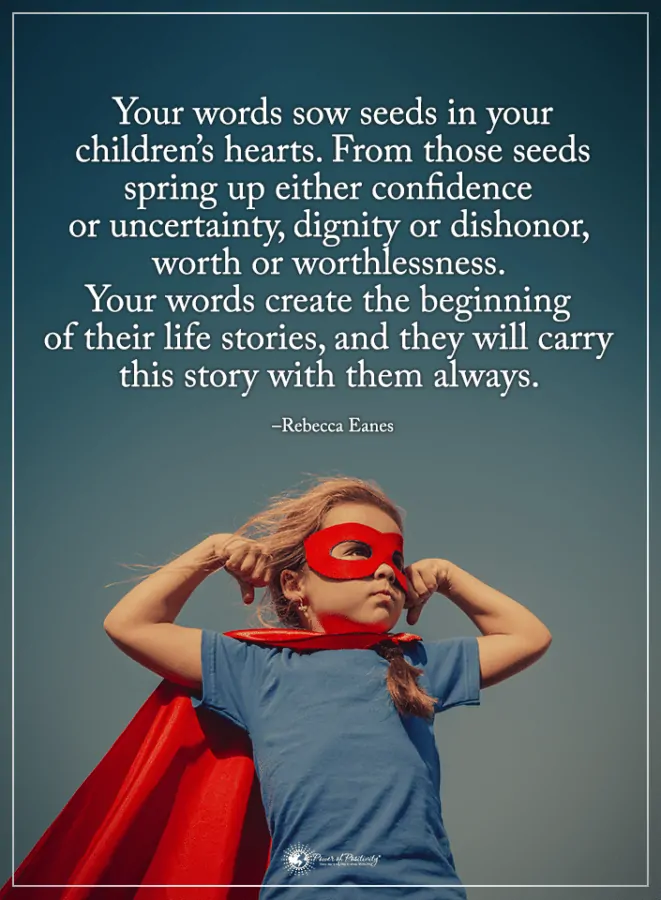Children need and deserve to know they are secure, safe, and loved. But that’s sadly not always the case.
Early childhood years are a period of rapid change in the brain. Early and middle childhood years are when the brain forms complex network connections at the fastest rate.
The forming of the brain’s neurons – a process known as myelination – is 80% complete by age four. In other words, the future adult’s brain is eight-tenths complete.
According to many scientists, the human subconscious dictates about 95 percent of our behavior. When does this “subconscious programming” take place?
“Beyond having their physical needs for food, water, shelter, and hygiene met, young children also need plenty of emotional and cognitive support, love, and nurturing. Adult caregivers should make it a point to express love and affection for their children every day.” ~ Angela Oswalt, MSW, Natalie Statts-Reiss, Ph.D., and Mark Dombeck, Ph.D.
From birth to six years.
What’s the significance?
As you know, the brain is responsible for almost everything we think, say, and do. If a child isn’t adequately nurtured, brain development is inevitably affected. Hence, the child’s emotional networks are underdeveloped.
The correlation between the childhood brain’s developmental traits and personality characteristics is both indisputable and universal.
Peg Streep, a New York City-based psychologist, explains the relationship between early childhood and adult life:
“While it’s true that everyone’s childhood experience is different … there are nonetheless broad and reliable statements which can be made about the effect of (childhood) experiences. They are invaluable to understanding how your childhood shaped your personality and behaviors.”
Streep’s passage begs the question: Just what behaviors, or signs, does a person display who was unloved and neglected during childhood?
Here are seven behaviors of adults unloved as children:
1. Lack of trust
Developing a sense of trust on an individual level requires a steady external environment. During childhood, it is essential that the people around us be relatively stable. We must feel safe and feel some semblance of emotional giving from others.
Without a stable and nurturing environment, the child may very well find it difficult to trust others. Of course, this underdevelopment makes just about every type of relationship difficult.
2. Poor emotional intelligence
Children learn to interpret emotions primarily through dyadic communication such as words and gestures. Both play a crucial role in helping the child articulate their feelings, manage fears, understand negative emotions, and develop resilience.
Without the ability to correctly interpret their emotional states, the child may never develop an essential life quality: emotional intelligence.
3. Fear of failure
Tragically, children who grow up in a neglectful environment never develop a healthy sense of self-worth. On the other hand, a stimulating and loving environment can instill confidence and fortitude.
Unloved children almost certainly feel an absence of self-esteem. This manifests as an unjustifiable sense of failure. Many otherwise intelligent people don’t live up to their potential only because they weren’t loved and embraced as children.
4. Toxic relationships
The human brain learns primarily through association and pattern recognition. In psychology and cognitive neuroscience, pattern recognition is “a cognitive process that matches information from a stimulus (the outside world) with information retrieved from memory.”
Regarding relationships, the unloved child will seek out the familiar; namely, toxic people.
5. Insecurity and attachment
Every legitimate mental health expert will agree that a positive environment outside of the home helps – at least, to some degree – counteract the negativity found inside of the home.
But this is where things get complicated (and infuriating).
If a child can not rely on the very people who are responsible for ensuring his or her caregiving, how can he or she rely on anyone?
6. Depression and anxiety
It is no surprise that unloved children often battle mental health issues.
Depression and anxiety stemming from (a) having experienced neglect, and (b) the inevitable complications that surface once the child ages, are commonly-cited experiences.
Depression and anxiety are the two most common mental health issues in the world. And the chances of an adult developing both increases substantially with a history of neglect.
7. Oversensitivity
We’ve all heard the term “Don’t take it personally.” On the whole, this is solid advice. People dealing with their own issues often project these issues onto others, and it behooves us to understand this human inclination.
However, for someone who had the misfortune of growing up in an unloving home, to not take things personally goes against the grain of their psyche. After all, the person must now contend with an intense fear of rejection – a byproduct of feeling insignificant and unloved.
“Stop being so sensitive” is a go-to phrase of abusers; ironically, this belittlement only heaps onto the person’s already fragile sensibilities. This may also result in a leaning towards having panic attacks.
Final Thoughts on Unloved Children
“Overall, caregivers communicate love and nurturing through how they live their own lives.”
Everyone has their own way of showing love to children; but it is through showing love – regardless of the method – that sets the very foundation for the rest of their lives.
In an article named “Early Childhood Love And Nurturing,” written by three prominent child psychologists, the experts provide the following advice:
– Making it a priority to demonstrate love and affection for your children every day.
– Giving words of praise when earned (through chores, academic achievements, etc.)
– Showing a positive outlook and exhibiting emotional maturity (calmness, patience, etc.) creates a peaceful environment for children.
– As a parent or caregiver, feeling “consistently grouchy, irritable, negative, or sad” may hinder a child’s development.
– It is necessary “to get assistance … (through) a support system for encouragement and assistance.”


















